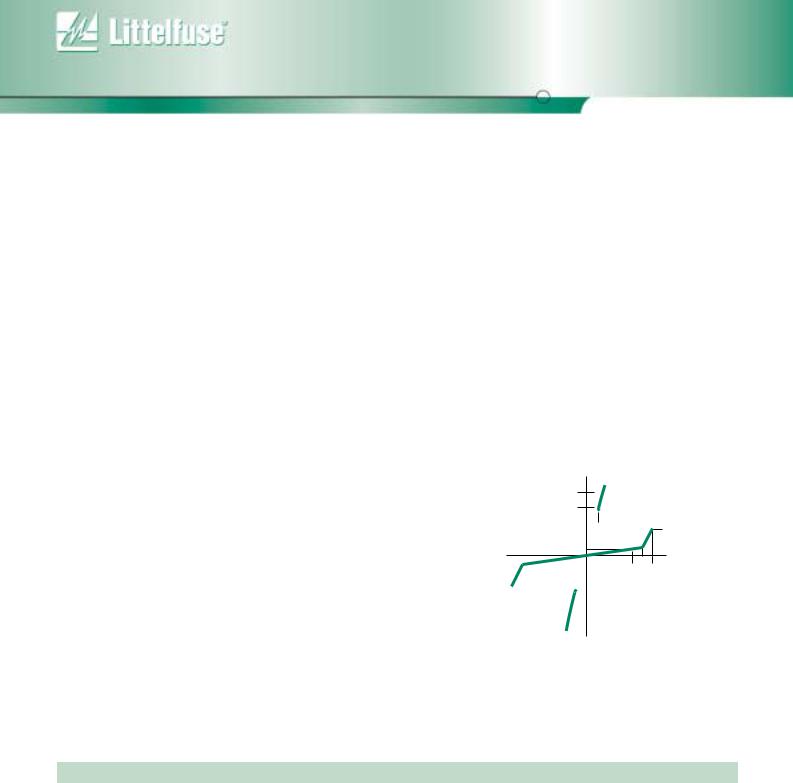LITTELFUSE CR0300SC, CR0300SB, CR0300SA, CR2300SC, CR2300SB Datasheet
...
CRxxxx series
Description
The CR range of protectors are based on the proven technology of the T10 thyristor product. Designed for transient voltage protection of telecommunications equipment, it provides higher power handling than a conventional avalanche diode (TVS) and when compared to a GDT offers lower voltage clamping levels and infinite surge life.
Packaged in a transfer molded DO-214AA surface mount outline designed for high speed pick & place machines used in today’s surface mount assembly lines.
Electrical Charecteristics
The electrical characteristics of a CRXXXX device is similar to that of a self gated Triac, but the CR is a two terminal device with no gate. The gate function is achieved by an internal current controlled mechanism.
Like the T.T.S. diodes, the CRXXXX has a standoff voltage (Vrm) which should be equal to or greater than the operating voltage of the system to be protected. At this voltage (Vrm) the current consumption of the CRXXXX is negligible and will not effect the protected system.
When a transient occurs, the voltage across the CRXXXX will increase until the breakdown voltage (Vbr) is reached. At this point the device will operate in a similar way to a T.V.S. device and is in an avalanche mode.
The voltage of the transient will now be limited and will only increase by a few volts as the device diverts more current. As this transient current rises, a level of current through the device is reached (Ibo) which causes the device to switch to a fully conductive state such that the voltage across the device is now only a few volts (Vt). The voltage at which the device switches from the avalanche mode to the fully conductive state (Vt) is known as the Breakover Voltage (Vbo). When the device is in the Vt state, high currents can be deverted without damage to the CRXXXX due to the low voltage across the device, since the limiting factor in such
devices is dissipated power (V x I).
Resetting of the device to the non conducting state is controlled by the current flowing through the device. When the current falls below a certain value, known as the Holding Current (Ih), the device resets automatically.
As with the avalanche T.V.S. device, if the CRXXXX is subjected to a surge current which is beyond its maximum rating, then the device will fail in short circuit mode, this ensures that the equipment is ultimately protected.
Selecting A CRXXXX
1.When selecting a CRXXXX device, it is important that the Vrm of the device is equal to or greater than the operating voltage of the system.
2.The minimum Holding Current (Ih) must be greater than the current the system is capable of delivering otherwise the device will remain conducting following a transient condition.
IT |
|
IH |
|
VT |
IBO |
IRM |
|
VRM |
VBR |
VBO |
|
|
MIN |
V-I Graph |
|
Illustrating Symbols and Terms for
the CR Surge Protection Device.
The CRXXXX Range Can Be Used to Protect Against Surges As Defined In The Following International Standards.
|
|
|
SA |
SB |
SC |
FCC Rules Part 68/D |
Metallic |
10/560µs |
50A |
100A |
100A |
|
Longitudinal |
10/160µs |
100A |
150A |
200A |
Bellcore Specification |
TR-NWT-001089 |
10/1000µs |
37A |
75A |
100A |
|
|
2/10µs |
- |
- |
500A |
|
|
100v/µs |
1KV |
1KV |
1KV |
ITU K-17 (Formerly CCITT) |
Voltage Wave Form |
100/700µs |
- |
1.5KV |
1.5KV |
|
Current Wave Form |
5/310µs |
- |
38A |
38A |
VDE 0433 |
Voltage Wave Form |
10/700µs |
- |
2KV |
4.0KV |
|
Current Wave Form |
5/310µs |
- |
50A |
100A |
C-NET 131-24 |
Voltage Wave From |
0.5/700µs |
1.0KV |
1.0KV |
4.0KV |
|
Current Wave Form |
0.8/310µs |
25A |
25A |
100A |
IEC 1000-4-5 |
(Discharge through 2Ω impendance) I |
8/20µs |
- |
100A |
250A |
|
Voltage Wave Form |
1-2/50µs |
- |
300V |
500V |
ITU K-20 |
Voltage Wave Form |
10/700µs |
1000V |
10000V |
4000V |
(Formerly CCITT) |
Current Wave Form |
5/310µs |
25A |
25A |
100A |
|
|
|
|
|
|
w w w. l i t t e l f u s e . c o m
52
